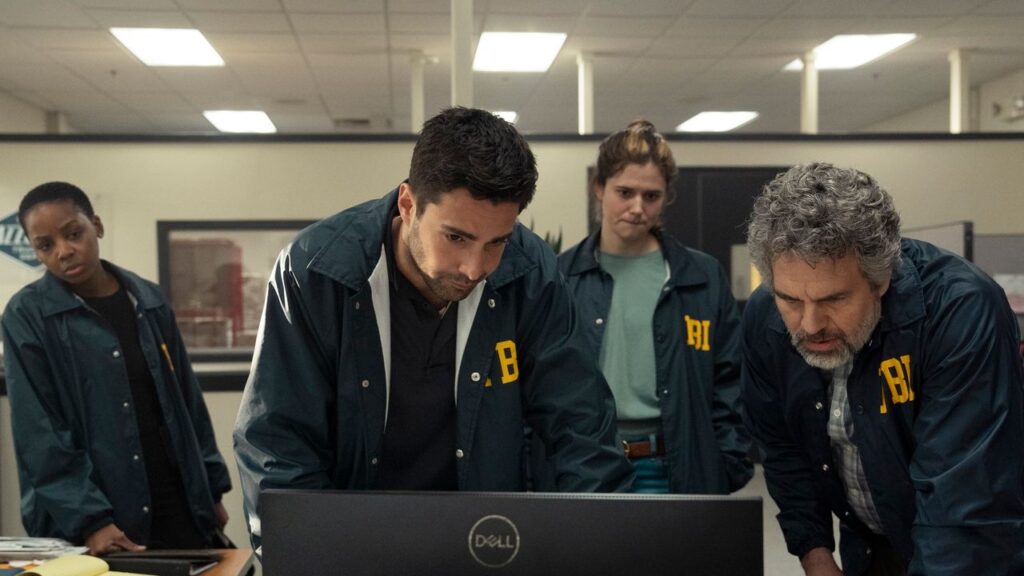In the initial draft, that scene didn’t exist, which feels crazy to me thinking about it now. I remember Brad sending it to me maybe at like midnight, or something like that, on a Sunday night, and he was like, ‘I just wrote this, what do you think?’ It’s reminiscent to me of that De Niro-Pacino Heat scene. It’s a scene that takes place across a table, between two characters, where they’re both unwilling to lay out their real cards, and they’re playing this game of cat and mouse.
Grasso doesn’t explicitly deny that he’d worked with the Dark Hearts before. Why did you think that is?
I mean, you said it so well, you were like: I think he’s quite a moral guy. It’s totally something that I feel about him, and I know that Brad does… I don’t know that Grasso would feel that comfortable out-and-out lying to a priest, as someone who values his relationship to his Catholicism, [and] his relationship to God, in the way that he does. That’s a real moment to sit opposite a priest, and go, ‘I didn’t do it.’ And he doesn’t, and he can’t. Nor can he say ‘I did.’ And that’s the conundrum, isn’t it?
It’s really interesting you note there that actually conversation is really between Grasso and Tom The Priest, as opposed to Tom His Boss.
That’s all I wrote on my notes. I kept writing on my script, ‘He is the priest. Therefore he is the voice of God.’ That’s how Grasso sees this conversation. So in that sense, that’s why it felt like such a potent scene to me. It felt way bigger than just Grasso dealing with the fact that he’s a young man who’s done wrong, and cost someone’s life… I can’t remember quite what [Grasso] says, but it’s something along the lines of, ‘When we finally make our way up to heaven, does God just [act] as if these things never existed?’
I can’t remember the specific line either, but I think he’s basically asking, ‘Does God ever truly forgive?’
And that’s what I think he’s facing for the whole show. Especially in the second half. I imagine [that’s] what being someone who is very devout to your religion is, or at least feels it massively, that what you’re constantly thinking about is not just life now, it’s about the afterlife. It’s like, What will life look like when I’m no longer a sentient being? And I suppose that’s a very prevalent feeling for him. It essentially governs him into whatever the next step of his life will be.
In that conversation with Tom, he stops short of confessing, but I wondered if there’s a part of him that wants to. My thought was that he’s looking for forgiveness; that’s what he craves in that moment.
Well, I guess the reality is that he doesn’t go to Tom’s house, Tom comes to his house. And I think he’s looking for very little. I think he’s looking to be left alone… In his eyes, Tom’s arrival is God knocking on his door and making him ask those questions of himself that he probably hadn’t wanted to ask. And suddenly someone’s in front of him like, ‘You can be forgiven, all you have to do is ask.’ I think he’s forced to come to terms with these things. And that’s what Brad does so well: [he] puts characters up against a wall, where they have to make a decision there and then, or at least the decision that they’re going to make is informed by the there-and-then.
Let’s jump back to the opening sequence of the episode, those 15 minutes in the woods…
It’s so hard when you’re shooting a scene like that, you can’t in any way see… I know how I felt reading it, but when you’re filming it, you’re all shooting separate bits in different parts of the woods at any given time. And that shoot took, like, three weeks. Brad sent me the cut when I was in New York about six months ago, and I remember just being like, ‘Oh my god.’ It felt to me like early Denis Villeneuve. That feeling that I had when I watched the car scene in Sicario. I felt that same adrenaline watching that sequence.
I think the most consequential moment for Grasso is obviously Lizzie’s death. What was the mood on the day you shot it?
I was very nervous, because you know you’ve got to get a place… Rhys Ifans, who I work with on House of the Dragon, said this thing to me; we were talking a lot about process when I was starting [on the show]. And Rhys has this incredible ability to, like, no matter how high stakes the scene he’s about to go into is, three minutes before he’s chatting, he’s sipping a coffee. And I remember feeling like, Don’t you feel like you need to be like, in it? And he’s like, ‘But if I’m in it all day, by the time we get to shoot, I’ve exhausted myself of the potential of having access to something that’s supposed to feel so sudden.’ And that has always stuck with me so much, in a world where people talk about ‘The Method,’ and whatever that means.


